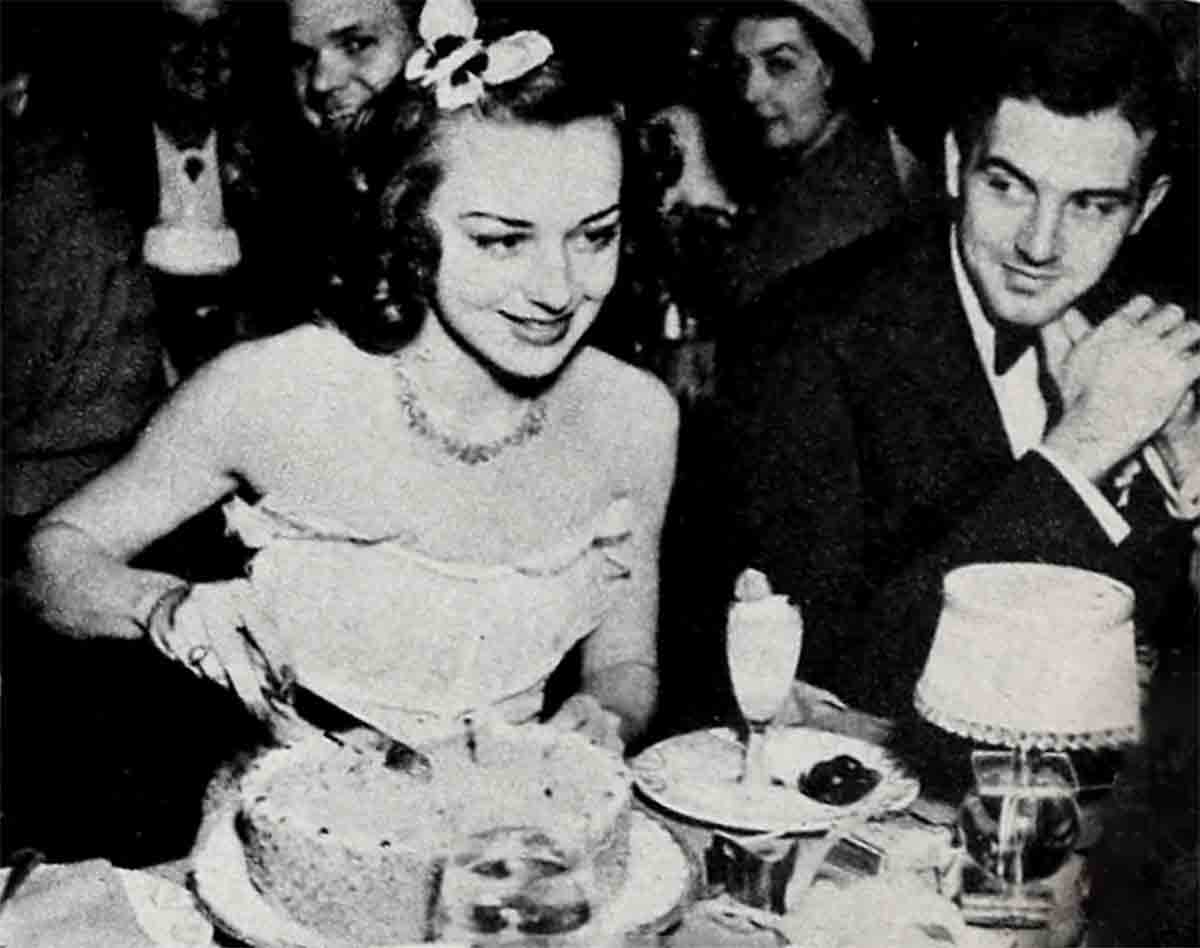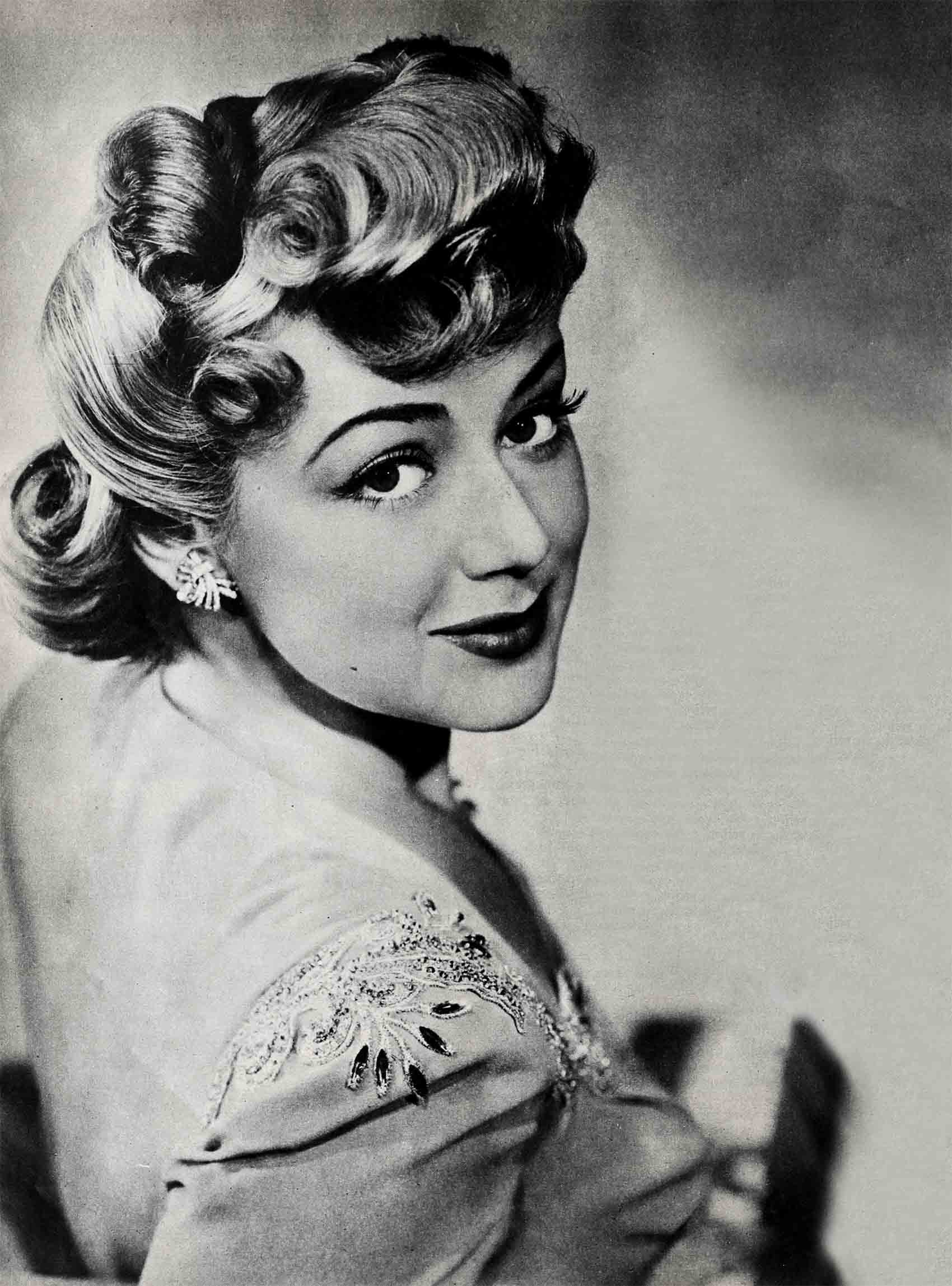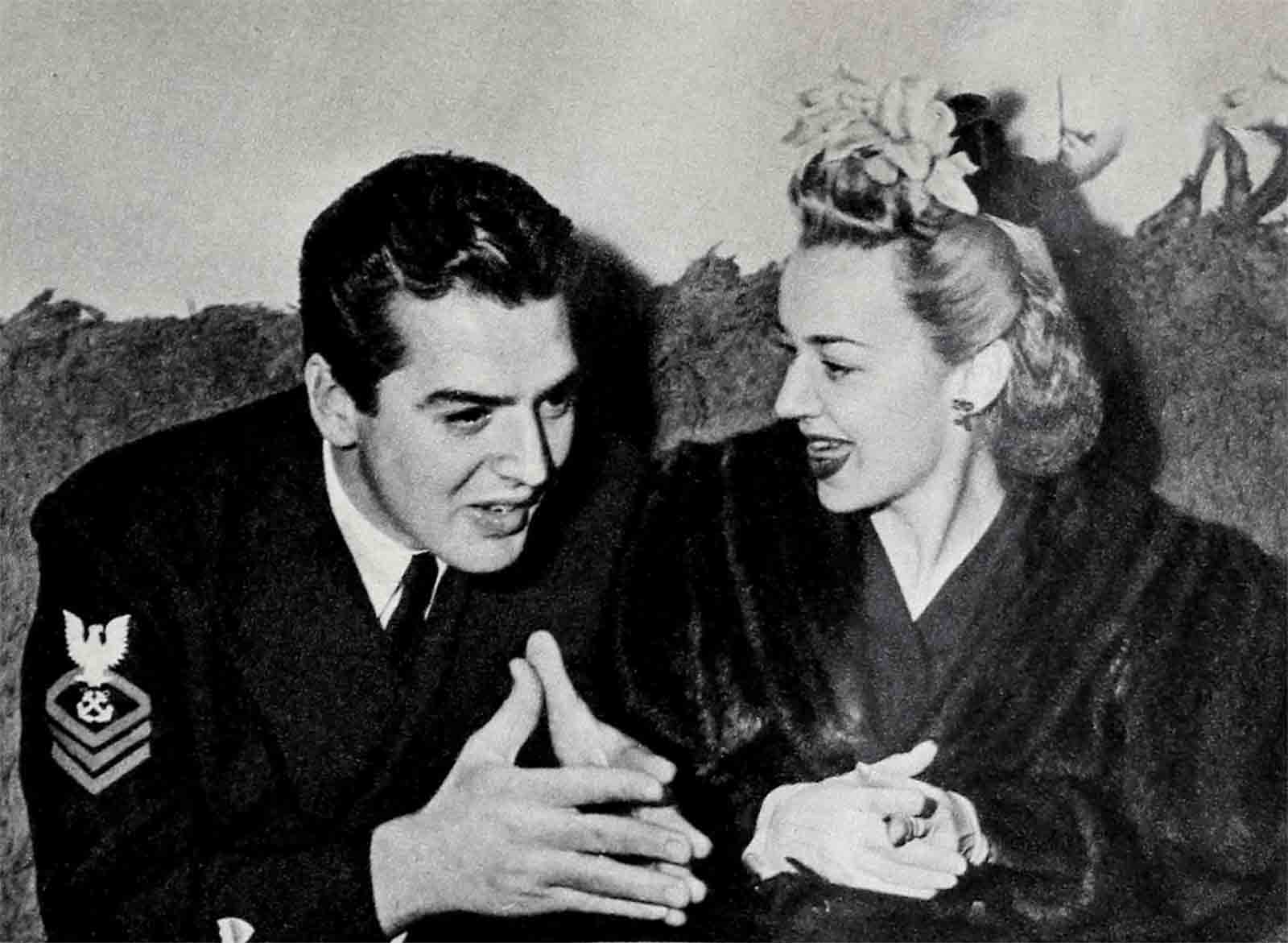
Deal Yourself In On Life—Anne Shirley
Heads tum as she goes by . . . The Hollywood girls speculate about her; they ask each other if it was the failure of her marriage to John Payne that changed her; they try to analyze the new and great charm she has for men. What, they ask, has happened to Anne Shirley that she should be the one to capture the most spectacular man in a spectacular town; capture him and then not even bother to keep him?
Publicity, some called it, not without a tinge of envy, when Anne launched a bombshell by announcing her forthcoming marriage to Vic Mature who was back in Hollywood briefly to wind up some business matters after his one-man Bond tour, which you can read more about on page 30. Rebound, others diagnosed it; rebound for Vic after the hurt of his breakup with Rita Hayworth; rebound for Anne who was still trying to prove something to herself after the collapse of her marriage despite her gay romance with Eddie Albert and, more recently, Edgar Bergen’s interest in her.
But the explanations couldn’t change the exciting facts. Vic spotted Anne on the Mocambo dance floor with her agent Henry Willson. When the dance was over, he made his way to their table, Willson introduced them and from that point on the Bos’un took over Anne’s evening. Likewise the following evening. The next night he proposed and she accepted. Vic told friends that at last he had met the girl of his dreams and was madly in love. Anne told friends she loved him because he was vital and alive; she felt he was a real hero and for a long time she had envied girls who were waiting at home for their man at war. There was talk of a Nevada wedding or an extension of Vic’s leave to take care of California preliminaries, since he was due to return to ship the following Sunday.

Then on Saturday the whole thing blew up as spectacularly as it had begun. Anne gave one and all to understand quite definitely that she would not be marrying Mr. Mature. Vic accepted the end philosophically and left on schedule to return to sea duty.
Hollywood reached for the smelling salts and the telephone—and for the second time in ten days Anne was the most talked-about girl in town. She doesn’t mind all this too much, even though she knows what people are saying isn’t meant too kindly. For it proves to her how tremendous and complete her change has been. “Once,” she said, “it would have killed me to have their disapproval. It doesn’t now. I realize it is the fact that I no longer lean on them or get down on my knees to them that they do not like. And I revel in my new independence.”
She dates the beginning of her metamorphosis as being two years ago, when she and John Payne separated.
“Until then,” she said, “I never realized that the only person who is consistently going to do anything for you is you. I don’t mean people are selfish. They have their own jobs and their own problems, very little time indeed to sit down and think ‘What can I do to make Anne Shirley happy?’ Even my agent, who is paid to think about me, can only give me a small fraction of his time. He has other clients and he has his own life.

“It may sound odd,” she went on, “for a girl who was a child star to say she never learned to possess herself until she had grown up, married, had a child, and a divorce. But I say just that. When I was a child star I had my mother to supervise my home life. And if I so much as said, ‘Shall I lunch at the Brown Derby today?’ I had a crowd around advising me. Johnny, whom I married when I was eighteen, also looked after me.
“It was quite an experience for me to discover I must see that the gas bill was paid, that the milkman brought the milk, or life would not go on—would not go on smoothly, at any rate.
“That was only the beginning. Soon I had to stand on my own feet in other ways, decide exactly what I wanted to do and frequently find the courage to do it. I had to decide, for instance, to return—with Julie—to the Brentwood house we left when Johnny and I parted. To leave the house you and your husband have shared is somehow the conventional thing to do when there is a divorce. However, Johnny and I had not been happy in that house, had lived there only a short time and had shared very little in it. It was, however, important to Julie. She had played with Deanna Durbin’s small nephew and the other children who lived along our road ever since she could remember. The postman and the milkman were her friends. There was the neighborhood drugstore where she bought ice-cream cones. It was her world. So, facing this truth, I moved back.
“There’s no end to the trails you blaze when you begin to stand on your own feet. Your entire existence changes into a far better thing than it ever was before. You change into a far, far more interesting and colorful human being than you were before—automatically.
“Little by little you gain initiative and confidence and release the individual you are potentially; an individual, incidentally, which far too many people keep forever trapped within themselves because of a combination of fears and inhibitions.
“I have found this business of standing on my own feet to be comprised of little things. Also that it takes a surprisingly long time, that it is as gradual a process as a baby’s learning to walk—taking one step, sitting down; then moving cautiously and not too surely from one object to another—while you measure your strength.

“It’s such a little thing as meeting people more bravely. So you don’t shrink down into your shoulders and talk too fast or else mumble so no one knows or cares what you say. So, instead, you speak up and, with your hand outstretched, say ‘How do you do. How are you?’ And, consequently, become more important in others’ eyes.
“It is such a little thing as when someone says: ‘Would you like a cocktail?’ You do not answer: ‘If you want one I’ll take one,’ but say, ‘Yes, thank you. I would like a Scotch Old-Fashioned!’
“At first you may be a little aggressive. But I don’t think this is too important when it means you are on the way to conquering yourself. I had many discouragements and setbacks when I began the long and still unfinished business of conquering myself—the only person or thing in the world I have any wish to conquer, by the way. However, I realized if I didn’t do this I would pay endlessly—in fears and trembling and tears in bed. In such recriminations as, ‘I’m nobody! I have no strength of character. I don’t know where I’m going. I don’t know what I’m doing.’
“Besides, there are good rewards along the way, even the first rockiest part of the way . . . There are all those times I when you can stand before your mirror and say, ‘I did all right tonight,’ or ‘Once I wouldn’t have had the courage to speak up.’
“Best of all,” Anne went on with frank triumph, “I no longer treat men any differently than I treat women. Because I no longer tremble in my boots for fear I won’t appear popular with men or for fear men themselves will think I’m running after them, I behave neither with exaggerated gaiety nor in a stiff, unfriendly manner. When I think of the men in the past I surely must have rebuffed by these poses—men who might have been good friends—I have a real sense of loss.
“Of course I have flirted. It’s such fun. But I’m twenty-four now, not sixteen. I’m twenty-four mentally and emotionally as well as in the family Bible. So I’ve known that flirting was a game, not anything to be taken seriously; and those I’ve flirted with have known this, too.
“Another thing: When you begin possessing yourself, even a little, you have more courage in your selection of clothes. If you long for a fuchsia dress you buy a fuchsia dress, irrespective of how startling it may be with your coloring. If anyone suggests your fuchsia dress is a little on the loud side you say, ‘I know. But it does something for me. I’m happy wearing it!’ And you do not give it away or hang it in the back of your closet.
“You don’t buy things you don’t want, either. If you go into a shop for a red blouse you don’t come out with a yellow blouse simply because you feel you must buy something after taking the salesgirl’s time. She probably is a nice person and your feeling that she thinks you ought to buy something is the product of your timid and uncertain mind.
“You also have your own opinions and you stand up to them. Even when everyone else at a party thinks So and So was magnificent in a certain picture you say, ‘I’m sorry, I thought she gave a dreadful performance,’ if that’s what you sincerely do think.
“Once,” she says, “if any critic said, ‘Anne Shirley gives a very bad performance,’ I would have had but one alternative—to kill myself!
“Now I would decide what that particular critic’s opinion was worth. Or if I should receive unanimously bad reviews—while I would be far from happy—I wouldn’t quit pictures. I would try to decide why my performance was as bad as it must have been . . . whether I hadn’t worked hard enough, hadn’t understood the character, or never should have been cast in that role in the first place.
“I keep thinking of a friend who did something I didn’t like recently. I went to her and said, ‘You did so and so. I don’t think it’s any good!’
“I couldn’t believe I was hearing my own voice. . . .
“My friend was pleased I had gone to her and given her a chance to explain. Which she did, very simply. So that our relationship now is better than ever before. Once it wouldn’t have been. Once I would have buried my head in the sand like an ostrich, said nothing, built up reservations and our relationship would have been ruined, of course.
“Don’t let me give the impression that I have conquered myself completely. Far from it. I’m still shy, among other things, about facing a crowd and being of any entertainment value. I can sit in a corner with a single person and tell the story about the Marine and the General and, like a good ham, enjoy doing this, hold interest and get a laugh. But should I be asked to repeat that story for a crowd I couldn’t do it to save my life. Proving, of course, I don’t possess myself too well at all.
“But I never stop giving thanks that I am, at least, on my way.
“For obviously it is only by standing on your own feet, by asserting yourself, that you can hope to win the favors life has to dispense. Obviously it’s stupid to sit back and expect individuality, popularity, success or love—or anything else—to drop into your lap.”
She smiled, a new and provocative smile. “I’ve found it an exciting business, too—discovering what I really think, what I really want, what I really feel—really meeting Anne Shirley. For twenty-two years I didn’t know myself at all; I lived with a stranger.
“That’s no fun. And it gets you nowhere—that is, nowhere you want to go.”
THE END
—BY ADLLE WHITEIY FLETCHER
It is a quote.PHOTOPLAY MAGAZINE JANUARY 1944




